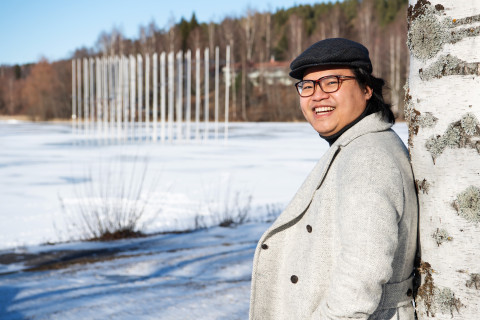Le Thanh Phuöng, a first-year student in the Master’s Degree Programme in Environmental Health and Technology (ENHET), calls for hard facts in discussions on environmental issues. Consequently, from four different modules in the ENHET programme, Phuöng found the perfect match: the data-oriented Environmental Informatics that allows him to dive deep into data mining and modelling for the benefit of the environment.
Debunking myths
When asked how he chose his fields of study, Vietnam-native Phuöng has a really useful tip to share.
‒It took me a while to figure out what I wanted to study. I did a lot of research, and one thing that helped me the most was reading newspapers and journals from the desired field. When you start digging deeper in the subject, you see whether it fascinates you or not, and it helps you choose.
That way Phuöng first decided to study Chemistry, when he left his home country after high school for studies in the US. However, gradually he started to develop a growing interest in environmental issues ‒ so he ended up studying environmental engineering at Mikkeli University of Applied Sciences in Finland, and eventually in the ENHET programme at the University of Eastern Finland.
I want to protect humans and the environment with the help of data.
‒I have become more concerned about the environment. This Master’s degree programme has opened my eyes a lot. Not every statement in the media is true ‒ it all depends on how the numbers have been calculated. For instance, it is often stated that agriculture accounts for more emissions than transportation, but when you examine more closely on the calculations, you might realise that agriculture has taken into account everything from producing the plant seeds to the final product and waste food, whereas transportation has excluded e.g. manufacturing. Having real data to debunk these myths and focusing on real issues is important.
Maps and visualisations of environmental data
For Phuöng, the studies in Environmental Health and Technology have built a solid understanding on a basic principle: if you want to protect humans, you need to protect the environment.
‒I want to make the environment better, and my way to do it is through data. In this MDP, you could also focus on air pollutants and aerosols, radiation or water protection, but I chose Environmental Informatics as it is about applying information technology to environmental issues and conducting data mining and complex data analysis on environmental data.
In practice, he could do things like draw maps and visualisations of different kind of data: water levels, populations of trees or even the impacts of tourism, for instance.
‒When you calculate the number of seasonal tourists in a specific place at a specific time, you can visualise where they will be at which time, and then distribute resources accordingly ‒ for instance to combat littering or other tourism-related problems.
Even though Phuöng was the first student in the newly compiled MDP to choose this study path and he had to consult his supervisor for the best choice of courses, he feels that now everything is running smoothly.
‒The programme is very well designed, and it is definitely the right choice for me. I have no resistance to study ‒ actually it feels like I’m not studying at all. Of course, not every course is 100% pleasant, but almost everything truly is.
Studying in Finland is not stressful
What Phuöng really appreciates is that studying in Finland doesn’t feel stressful at all, and the teachers and professors are easy to approach.
‒In the US you had to be very formal at the university, but here it’s the opposite. You don’t have to address your teachers Mr or Mrs, but you can just call them by the name. All the staff members are super helpful and friendly.
Another thing that Phuöng points out is that as a student, you don’t feel “threatened”, because you can resit any exam.
‒In some universities abroad, you have to do the whole course again if you fail one exam. I think it increases the pressure for cheating. But here students feel safe and not tempted to cheat as there is the possibility to resit.
All in all, Phuöng praises how the education system here allows students to take responsibility of their own learning, and participate in open discussions on lectures.
‒The teachers don’t push you too much, but just the right way. They let you grow, because they know that you really want to do your best.
Safety in Finland extends from classrooms to the whole society.
‒My Mom was happy to notice that Finland is a very safe country, when he visited me from Vietnam. It sort of took the worry away from her.
Phuöng has become so well inserted into the Finnish society that he would like to stay - and he will most likely apply for a PhD position and jobs ‒ but there’s no pressure for that right now.
‒I’m starting to plan my thesis, which I would like to do in cooperation with a company. Most likely it will be something about modelling, predicting things - whether it is related to water protection or the carbon footprint of agriculture, I don’t yet know. But it will be super interesting.

